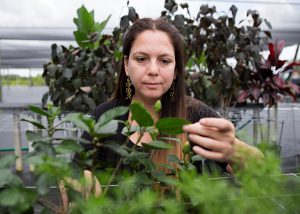- Apple and pecan orchards are growing vulnerable to nonnative ambrosia beetles. Often considered as invasive pests, these groups of beetles cultivate and rely on ambrosia fungi for nutrition.
- The ambrosia beetles, which make up more than 400 species, can infest and cause significant damage to tropical fruit and ornamental trees including avocado, woody ornamentals within nurseries, and field-grown palms located in subtropical zones of the southern United States.
- Targeting new research on this pest group and their fungal symbionts is a University of Florida scientist at the Institute of Food and Agricultural Sciences (UF/IFAS) who has joined a highly specialized team awarded a $7.5M grant from the US Department of Agriculture.
HOMESTEAD, Fla. – University of Florida plant pathologist Romina Gazis studies fungal-associated diseases affecting many types of tropical and subtropical crops.

Gazis also directs the Plant Diagnostic Clinic at the UF/IFAS Tropical Research and Education Center, serving farmers, greenhouse producers, landscape contractors, turf managers, arborists, nurseries and others in agriculture and the green industries of Florida’s southern counties.
Now, she’s joining a group of scientists nationwide on a $7.5 million federal grant to study the beetles that harm fruit trees and woody ornamental crops.
Gazis and her colleagues received a grant from the U.S. Department of Agriculture National Institute of Food and Agriculture (USDA-NIFA) to study ambrosia beetles and their associated fungi.
Over the next four years, the team will explore the behavior, impacts and vulnerabilities of ambrosia beetles, develop and implement monitoring tactics, identify mitigation strategies and much more.
“It is critical that we understand the biology of the fungi associated to these beetles,” said Gazis. “The ambrosia fungi are the food source for the beetles, and often are the causal agent of the diseases seen on their plant hosts. My role within the research team is to provide support to other laboratories in the identification, characterization and understanding of the fungal symbionts — the ambrosia fungi — associated with the ambrosia beetles.”

Gazis will also lead efforts to develop biological control strategies to manage fungal diseases transmitted by the ambrosia beetles, and she’ll use the avocado crop as a model system. Gazis’ portion of the grant is $300,000.
“I will use the avocado as a model system to test the possibility of using ‘good fungi’ to combat the ‘bad fungi’ carried and transmitted by ambrosia beetles,” said Gazis. “If we prevent the establishment of ambrosia fungi in the host plant, the beetles will have no food to eat and will consequently not be able to establish a colony inside the plant.”
Exotic ambrosia beetles established in the United States are emerging as highly destructive pests in apple and pecan orchards and continue to damage trees in ornamental nurseries. Beetle infestations cause significant economic damage in these three commodity groups. Substantial losses have been reported throughout the eastern United States and are more notably known as the culprit of Laurel wilt disease on the Florida avocado industry.
“To date, Laurel wilt has caused the loss of more than 140,000 trees in Florida, threatening not only the livelihood of the farmers but also the state’s economy, as the avocado industry has an overall economic impact of about $100 million per year,” said Gazis.
While researchers know a lot about the taxonomy of these beetles, scientists know less about the beetles’ ecology and their impact to the fruit and ornamental industry. Even less is known about the biology of their fungal symbionts. Management practices can be improved if we can better understand these organisms, she said.
“Ambrosia beetles cause economic losses to tree fruit producers. Add to that the cost involved in management practices such as insecticides, fungicides, monitoring tactics and all those factors contribute to increased fruit prices,” said Gazis. “This project will provide cost-effective solutions that will ameliorate the impact of pest and diseases.”
In the study, scientists will conduct field and laboratory research to maximize tree health and reduce tree vulnerability, optimize monitoring tactics, identify chemical and biological alternatives to broad-spectrum insecticides, determine the economic impacts of ambrosia beetles and transfer new knowledge by means of outreach and Extension to growers and consumers.
-30-
By: Lourdes Mederos, rodriguezl@ufl.edu
The mission of the University of Florida Institute of Food and Agricultural Sciences (UF/IFAS) is to develop knowledge relevant to agricultural, human and natural resources and to make that knowledge available to sustain and enhance the quality of human life. With more than a dozen research facilities, 67 county Extension offices, and award-winning students and faculty in the UF College of Agricultural and Life Sciences, UF/IFAS brings science-based solutions to the state’s agricultural and natural resources industries, and all Florida residents.
ifas.ufl.edu | @UF_IFAS
 0
0
